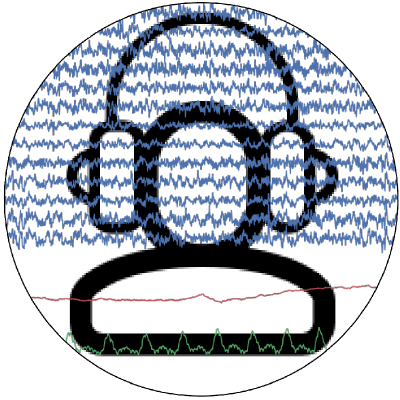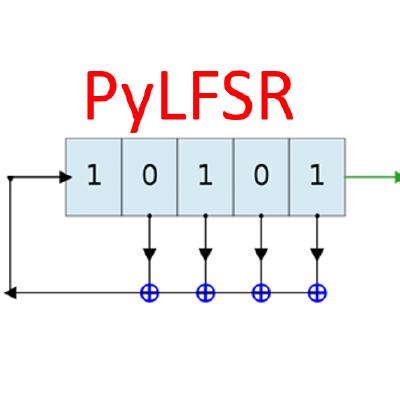3.1. Continues Wavelet Transform¶
>>> import numpy as np
>>> import matplotlib.pyplot as plt
>>> import spkit
>>> print('spkit-version ', spkit.__version__)
>>> import spkit as sp
>>> x,fs = sp.load_data.eegSample_1ch()
>>> t = np.arange(len(x))/fs
>>> sp.cwt.compare_cwt_example(x,t,fs=fs)
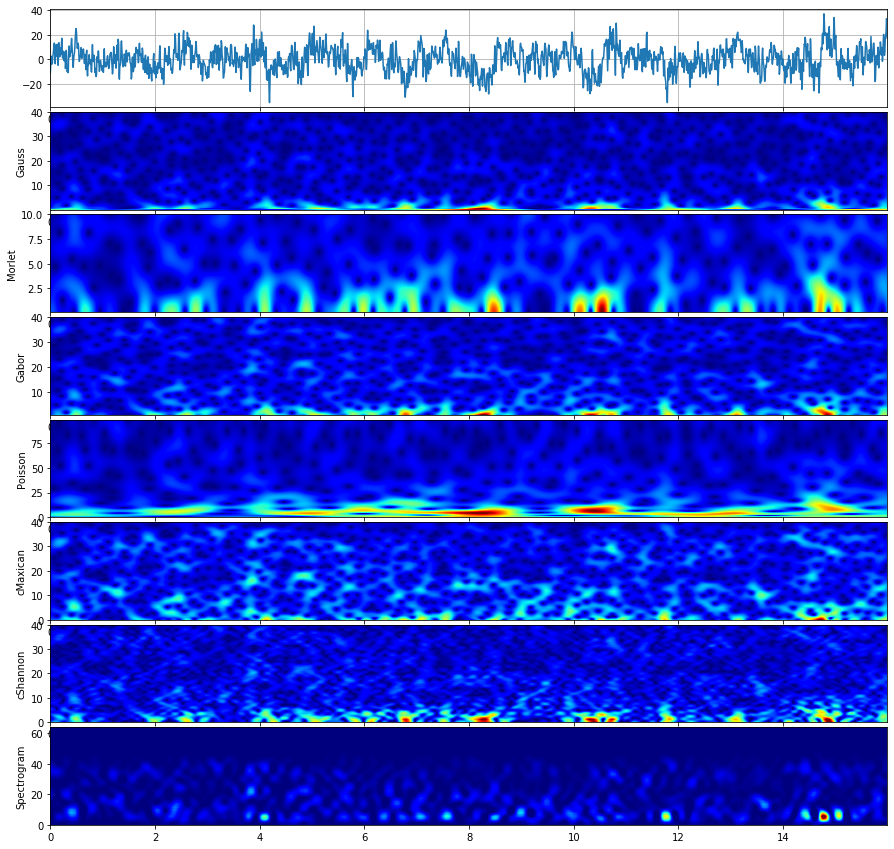
3.1.1. Gauss wavelet¶
The Gauss Wavelet function in time and frequency domain are defined as \(\psi(t)\) and \(\psi(f)\) as below;
where
Parameters for a Gauss wavelet:
f0 - center frequency
Q - associated with spread of bandwidth, as a = (f0/Q)^2
>>> XW,S = sp.cwt.ScalogramCWT(x,t,fs=fs,wType='Gauss',PlotPSD=True)
3.1.1.1. Plot wavelet functions¶
To plot as analysis the wavelet functions
>>> fs = 128 #sampling frequency
>>> tx = np.linspace(-5,5,fs*10+1) #time
>>> fx = np.linspace(-fs//2,fs//2,2*len(tx)) #frequency range
>>> f01 = 2 #np.linspace(0.1,5,2)[:,None]
>>> Q1 = 2.5 #np.linspace(0.1,5,10)[:,None]
>>> wt1,wf1 = sp.cwt.GaussWave(tx,f=fx,f0=f01,Q=Q1)
>>> f02 = 2 #np.linspace(0.1,5,2)[:,None]
>>> Q2 = 0.5 #np.linspace(0.1,5,10)[:,None]
>>> wt2,wf2 = sp.cwt.GaussWave(tx,f=fx,f0=f02,Q=Q2)
>>> plt.figure(figsize=(15,4))
>>> plt.subplot(121)
>>> plt.plot(tx,wt1.T.real,label='real')
>>> plt.plot(tx,wt1.T.imag,'--',label='image')
>>> plt.xlim(tx[0],tx[-1])
>>> plt.xlabel('time')
>>> plt.ylabel('Q=2.5')
>>> plt.legend()
>>> plt.subplot(122)
>>> plt.plot(fx,abs(wf1.T), alpha=0.9)
>>> plt.xlim(fx[0],fx[-1])
>>> plt.xlim(-5,5)
>>> plt.xlabel('Frequency')
>>> plt.show()
>>> plt.figure(figsize=(15,4))
>>> plt.subplot(121)
>>> plt.plot(tx,wt2.T.real,label='real')
>>> plt.plot(tx,wt2.T.imag,'--',label='image')
>>> plt.xlim(tx[0],tx[-1])
>>> plt.xlabel('time')
>>> plt.ylabel('Q=0.5')
>>> plt.legend()
>>> plt.subplot(122)
>>> plt.plot(fx,abs(wf2.T), alpha=0.9)
>>> plt.xlim(fx[0],fx[-1])
>>> plt.xlim(-5,5)
>>> plt.xlabel('Frequency')
>>> plt.show()


3.1.1.2. With a range of scale parameters¶
Changing the range of scale
>>> f0 = np.linspace(0.5,10,10)[:,None]
>>> Q = np.linspace(1,5,10)[:,None]
>>> #Q = 1
>>> wt,wf = sp.cwt.GaussWave(tx,f=fx,f0=f0,Q=Q)
>>> plt.figure(figsize=(15,4))
>>> plt.subplot(121)
>>> plt.plot(tx,wt.T.real, alpha=0.8)
>>> plt.plot(tx,wt.T.imag,'--', alpha=0.6)
>>> plt.xlim(tx[0],tx[-1])
>>> plt.xlabel('time')
>>> plt.subplot(122)
>>> plt.plot(fx,abs(wf.T), alpha=0.6)
>>> plt.xlim(fx[0],fx[-1])
>>> plt.xlim(-20,20)
>>> plt.xlabel('Frequency')
>>> plt.show()

3.1.1.3. Signal Analysis - EEG¶
Example with EEG Signal
>>> x,fs = sp.load_data.eegSample_1ch()
>>> t = np.arange(len(x))/fs
>>> print('shape ',x.shape, t.shape)
>>> plt.figure(figsize=(15,3))
>>> plt.plot(t,x)
>>> plt.xlabel('time')
>>> plt.ylabel('amplitude')
>>> plt.xlim(t[0],t[-1])
>>> plt.grid()
>>> plt.show()

3.1.1.4. Scalogram with default parameters¶
With default setting of f0 and Q
f0 = np.linspace(0.1,10,100)
Q = 0.5
>>> XW,S = sp.cwt.ScalogramCWT(x,t,fs=fs,wType='Gauss',PlotPSD=True)
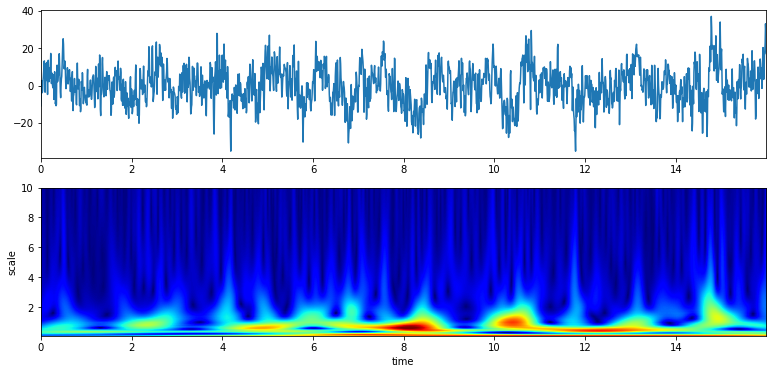
3.1.1.5. With a range of frequency and Q¶
From 0.1 to 10 Hz of analysis range and 100 points
>>> f0 = np.linspace(0.1,10,100)
>>> Q = np.linspace(0.1,5,100)
>>> XW,S = sp.cwt.ScalogramCWT(x,t,fs=fs,wType='Gauss',PlotPSD=True,f0=f0,Q=Q)
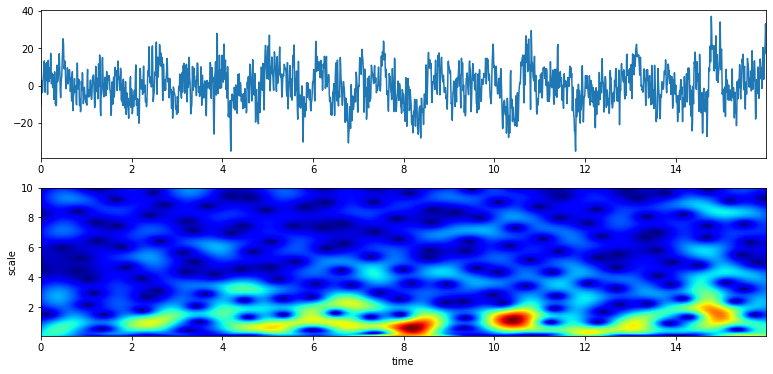
From 5 to 10 Hz of analysis range and 100 points
>>> f0 = np.linspace(5,10,100)
>>> Q = np.linspace(1,4,100)
>>> XW,S = sp.cwt.ScalogramCWT(x,t,fs=fs,wType='Gauss',PlotPSD=True,f0=f0,Q=Q)
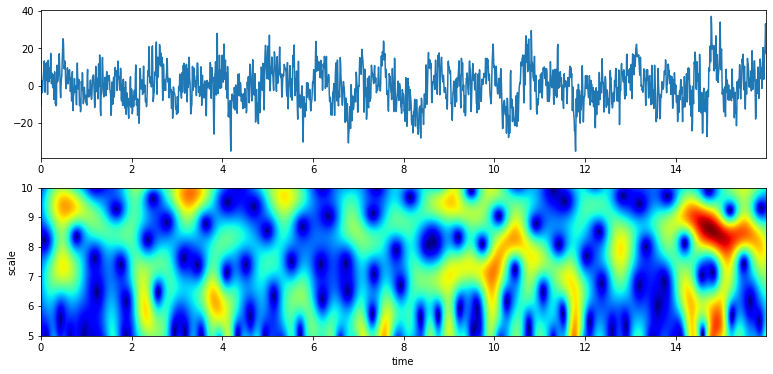
With constant Q
>>> f0 = np.linspace(5,10,100)
>>> Q = 2
>>> XW,S = sp.cwt.ScalogramCWT(x,t,fs=fs,wType='Gauss',PlotPSD=True,f0=f0,Q=Q)
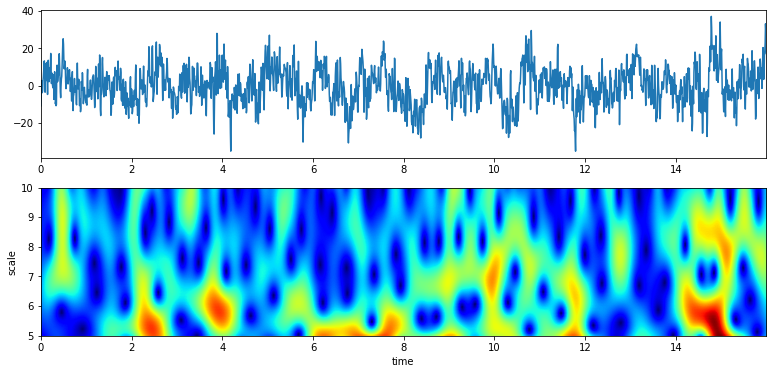
From 12 to 24 Hz
>>> f0 = np.linspace(12,24,100)
>>> Q = 4
>>> XW,S = sp.cwt.ScalogramCWT(x,t,fs=fs,wType='Gauss',PlotPSD=True,f0=f0,Q=Q)
3.1.1.6. With a plot of analysis wavelets¶
>>> f0 = np.linspace(12,24,100)
>>> Q = 4
>>> XW,S = sp.cwt.ScalogramCWT(x,t,fs=fs,wType='Gauss',PlotPSD=True,PlotW=True, f0=f0,Q=Q)
#TODO Speech/Audio Signal
3.1.1.7. Speech¶
#TODO
3.1.1.8. Audio¶
#TODO
3.1.2. Morlet wavelet¶
#TODO
The Morlet Wavelet function in time and frequency domain are defined as \(\psi(t)\) and \(\psi(f)\) as below;
where
>>> XW,S = sp.cwt.ScalogramCWT(x,t,fs=fs,wType='Morlet',PlotPSD=True)
3.1.3. Gabor wavelet¶
#TODO
The Gabor Wavelet function (technically same as Gaussian) in time and frequency domain are defined as \(\psi(t)\) and \(\psi(f)\) as below;
where
\(a\) is oscilation rate and \(f_0\) is center frequency
>>> XW,S = sp.cwt.ScalogramCWT(x,t,fs=fs,wType='Gabor',PlotPSD=True)
3.1.4. Poisson wavelet¶
Poisson wavelet is defined by positive integers ($n$), unlike other, and associated with Poisson probability distribution
The Poisson Wavelet function in time and frequency domain are defined as \(\psi(t)\) and \(\psi(f)\) as below;
3.1.4.1. #Type 1 (n)¶
where
Admiddibility const \(C_{\psi} =\frac{1}{n}\) and \(w = 2\pi f\)
>>> XW,S = sp.cwt.ScalogramCWT(x,t,fs=fs,wType='Poisson',method = 1,PlotPSD=True)
3.1.4.2. #Type 2¶
where
\[ \begin{align}\begin{aligned}p(t) &=\frac{1}{\pi}\frac{1}{1+t^2}\\w &= 2\pi f\end{aligned}\end{align} \]
>>> XW,S = sp.cwt.ScalogramCWT(x,t,fs=fs,,wType='Poisson',method = 2,PlotPSD=True)
3.1.4.3. #Type 3 (n)¶
where .
>>> XW,S = sp.cwt.ScalogramCWT(x,t,fs=fs,wType='Poisson',method = 3,PlotPSD=True)
#TODO
3.1.5. Maxican wavelet¶
Complex Mexican hat wavelet is derived from the conventional Mexican hat wavelet. It is a low-oscillation wavelet which is modulated by a complex exponential function with frequency \(f_0\) Ref..
The Maxican Wavelet function in time and frequency domain are defined as \(\psi(t)\) and \(\psi(f)\) as below;
where \(w = 2\pi f\) and \(w_0 = 2\pi f_0\)
>>> XW,S = sp.cwt.ScalogramCWT(x,t,fs=fs,wType='cMaxican',PlotPSD=True)
#TODO
3.1.6. Shannon wavelet¶
Complex Shannon wavelet is the most simplified wavelet function, exploiting Sinc function by modulating with sinusoidal, which results in an ideal bandpass filter. Real Shannon wavelet is modulated by only a cos function Ref.
The Shannon Wavelet function in time and frequency domain are defined as \(\psi(t)\) and \(\psi(f)\) as below;
where
where \(\prod (x) = 1\) if \(x \leq 0.5\), 0 else and \(w = 2\pi f\) and \(w_0 = 2\pi f_0\)
>>> XW,S = sp.cwt.ScalogramCWT(x,t,fs=fs,wType='cShannon',PlotPSD=True)
#TODO



